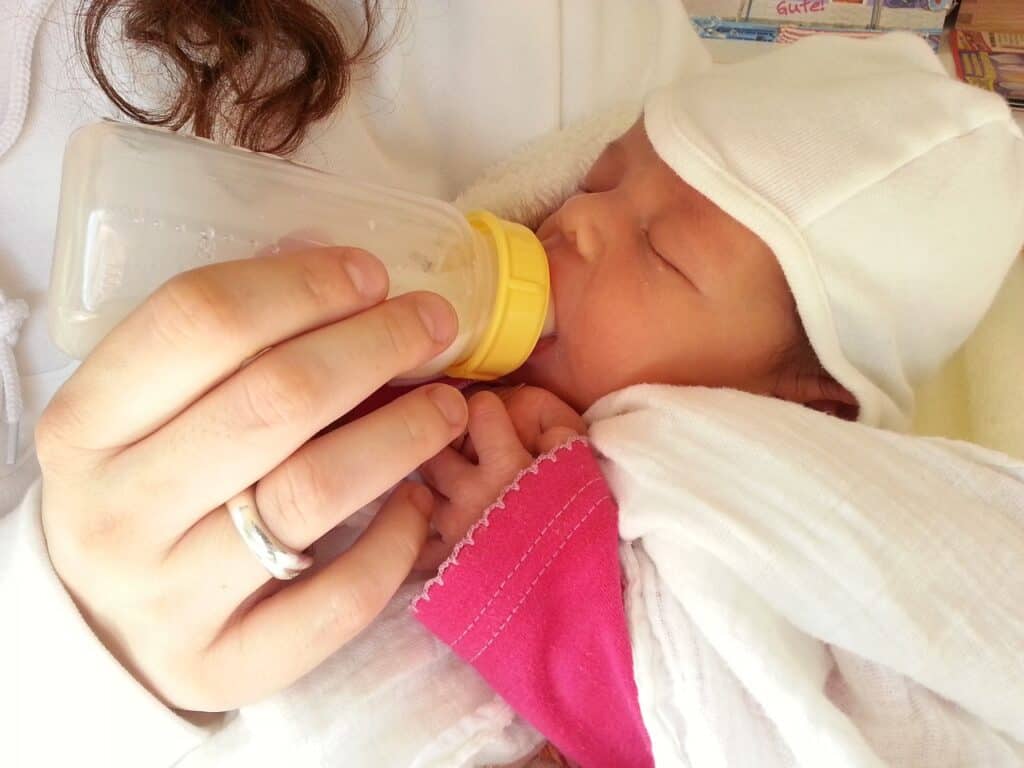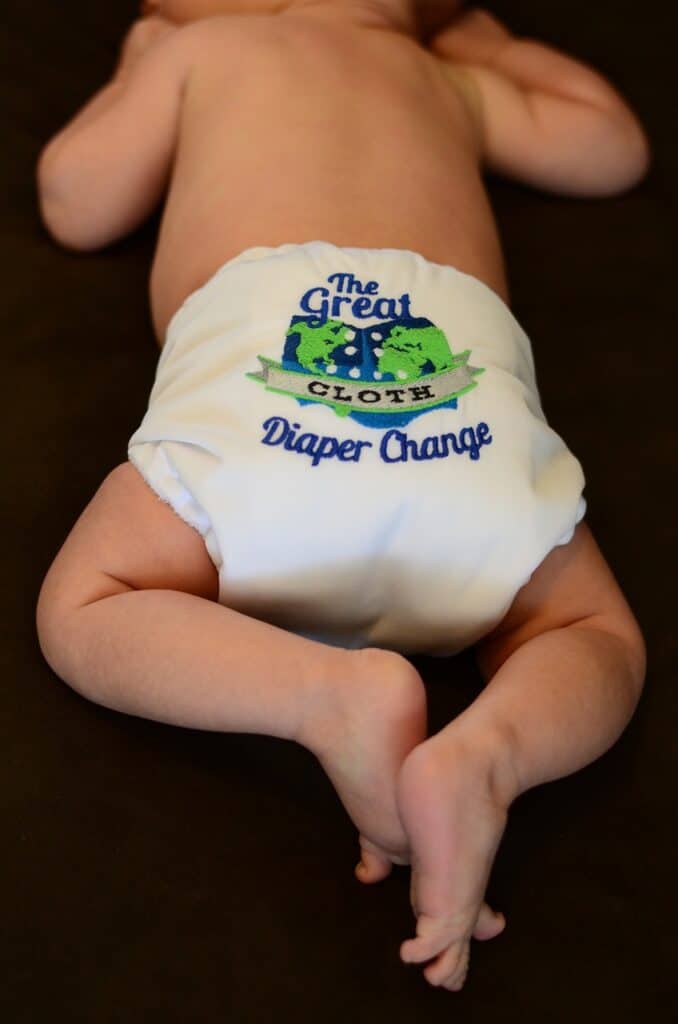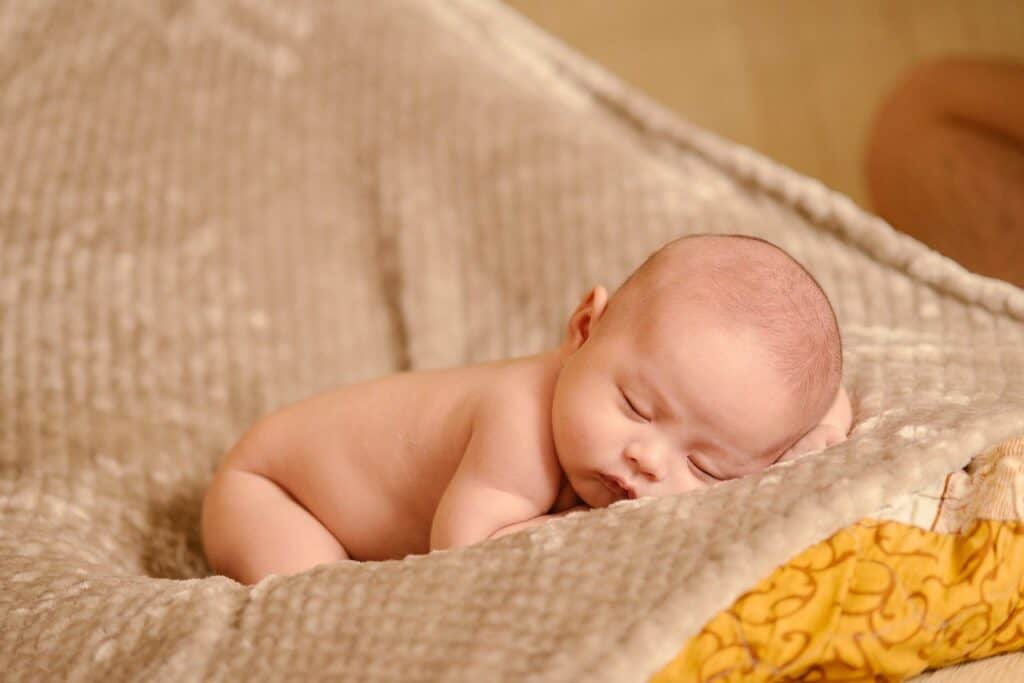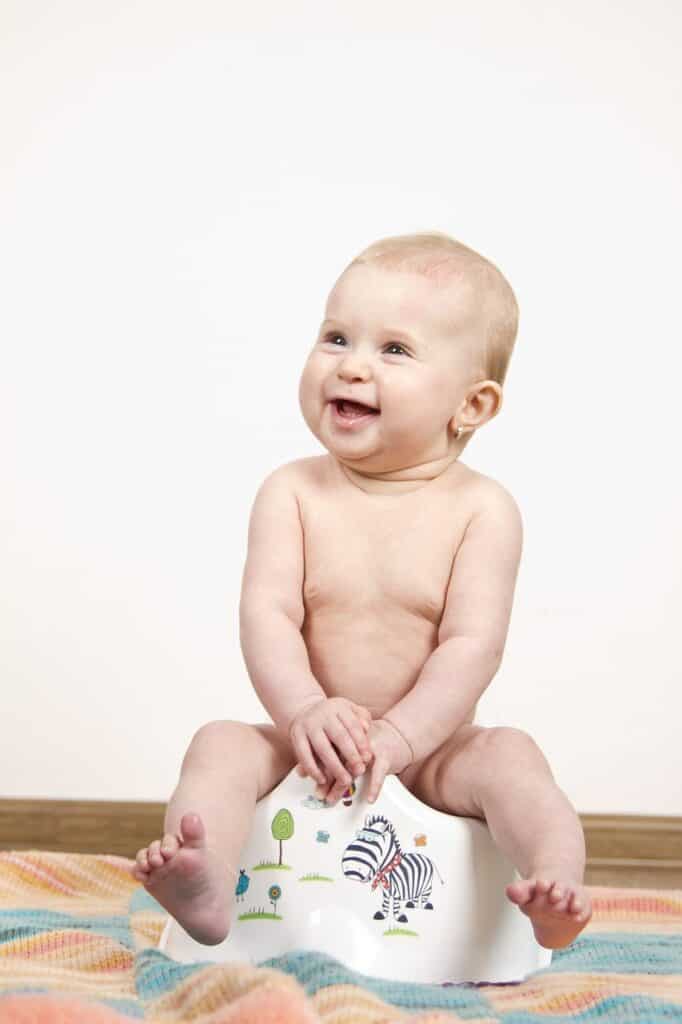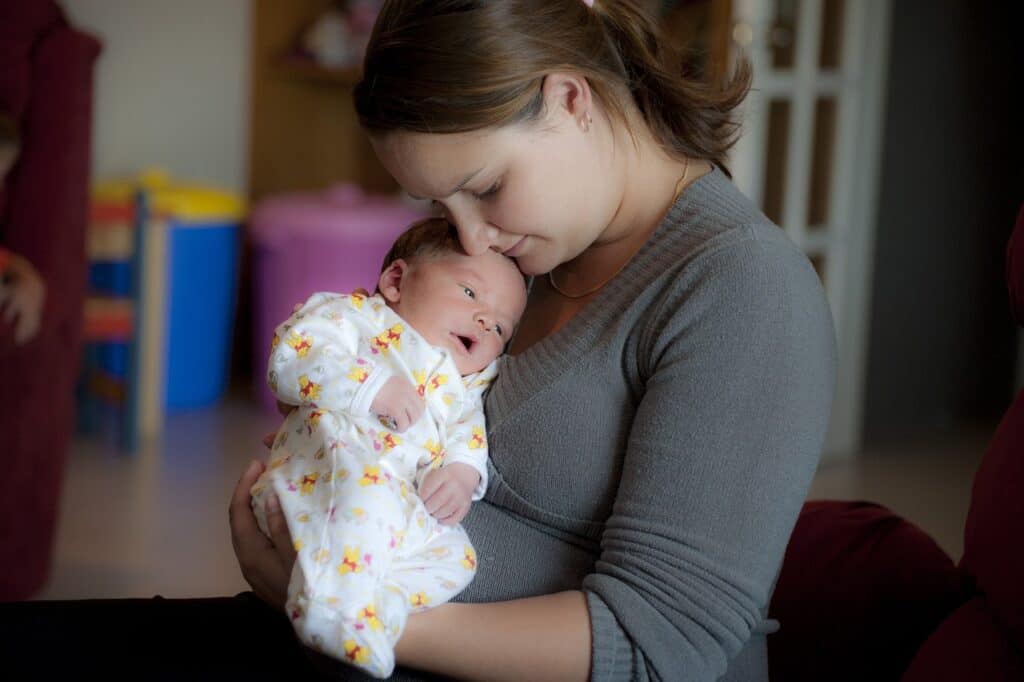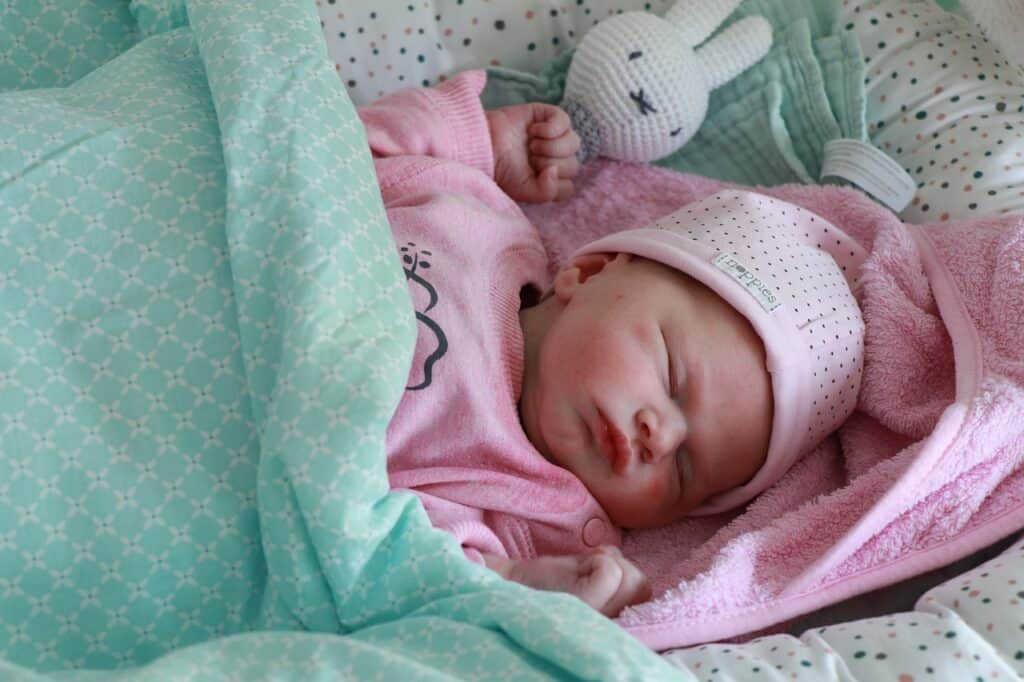Babies are known for their unpredictable sleeping and eating patterns. One question that may come to mind for new parents is whether babies poop in their sleep. The answer is yes, babies can and do poop in their sleep.
Understanding a baby’s bowel movements is an important aspect of caring for a newborn. Babies have immature digestive systems and may need to poop frequently, even during sleep.
It is normal for babies to poop anywhere from several times a day to once every few days.
Sleep and pooping patterns may vary from baby to baby. Some babies may sleep through the night without pooping, while others may wake up with a dirty diaper.
Feeding and its impact on poop can also play a role in a baby’s sleep and pooping patterns.
Key Takeaways
- Babies can and do poop in their sleep.
- Understanding the baby’s bowel movements is important for new parents.
- Sleep and pooping patterns may vary from baby to baby.
1. Understanding Baby’s Bowel Movements
Babies’ bowel movements can be a source of concern for new parents. Understanding what is normal and what is not can help parents identify potential issues and seek medical attention if necessary.
Frequency
Newborns may have several bowel movements a day, while older babies may have fewer. Breastfed babies tend to have more frequent bowel movements than formula-fed babies.
Color and Texture
The color and texture of a baby’s bowel movements can vary depending on their diet and age. Breastfed babies’ poop is usually yellow or green and has a loose, seedy texture. Formula-fed babies’ poop is typically firmer and may be tan or brown.
Consistency
A baby’s poop should be soft and easy to pass. Hard, pellet-like poop can indicate constipation, while watery poop may be a sign of diarrhea.
Smell
Baby poop typically has a distinct smell, but it should not be overly foul. A strong, unpleasant odor may indicate an infection or other issue.
Frequency of Pooping During Sleep
Babies may poop during sleep, but it is not uncommon for them to go several hours without a bowel movement. If a baby is consistently pooping during sleep, it may be a sign of an underlying issue and should be discussed with a pediatrician.
Overall, understanding a baby’s bowel movements can help parents identify potential issues and seek medical attention if necessary.
2. Sleep and Pooping Patterns
Babies have a unique sleep pattern that changes as they grow older. Newborns tend to sleep for most of the day and night, waking up every few hours to feed.
As they grow, they start sleeping for longer periods and eventually start sleeping through the night.
One of the concerns that parents have is whether their babies poop in their sleep. The answer is yes, babies do poop in their sleep. It is a normal part of their development, and it is nothing to worry about.
Babies have an immature digestive system, which means they have a hard time controlling their bowel movements. As a result, they may poop at any time, including during sleep.
This is more common in younger babies who are still developing their bowel control.
When babies poop in their sleep, it is usually not a cause for concern. However, if it happens frequently, it may be a sign of an underlying medical condition.
Parents should consult their pediatrician if they notice any unusual changes in their baby’s poop patterns.
It is important to note that babies eventually stop pooping at night as they grow older and develop better bowel control. Most babies stop pooping at night by the time they are six months old.
However, some babies may continue to poop at night until they are a year old or older.
In conclusion, babies do poop in their sleep, and it is a normal part of their development. Parents should not worry about it unless it happens frequently or is accompanied by other symptoms.
As babies grow older, they develop better bowel control and eventually stop pooping at night.
3. Feeding and Its Impact on Poop
The type of food a baby consumes can have an impact on their poop. Breastfed babies tend to have softer and more frequent bowel movements compared to formula-fed babies. Breast milk is easier to digest and contains antibodies that help prevent infections.
Formula-fed babies, on the other hand, may have firmer stools that are less frequent.
When babies start eating solid foods, their poop may change in color, texture, and frequency. Introducing new foods can cause changes in the digestive system, leading to different poop patterns.
Starchy foods like rice and bananas can cause constipation, while fiber-rich foods like prunes and peas can promote bowel movements.
It is important to note that each baby is unique, and their poop patterns may vary based on their individual digestion and feeding habits. Parents should monitor their baby’s poop and consult with a healthcare provider if they notice any significant changes or concerns.
4. Diapering Basics
Diapering is an essential part of caring for a baby, and it is important to do it properly to keep the baby clean, dry, and comfortable. Here are some basics of diapering that every new parent should know:
Types of Diapers
There are two main types of diapers: disposable and cloth. Disposable diapers are convenient and easy to use, but they can be expensive and are not environmentally friendly.
Cloth diapers are cheaper and more eco-friendly, but they require more work to clean and may not be as convenient.
Diaper Changes
Babies need to be changed frequently, especially during the first few weeks of life when they may go through 10 or more diapers a day. A wet or poopy diaper should be changed as soon as possible to prevent diaper rash and other skin irritations.
Dirty Diapers
A poopy diaper should be disposed of immediately. Use wet wipes or a damp cloth to clean the baby’s bottom and then dispose of the dirty diaper in a diaper pail or trash can.
Diaper Cream
Diaper cream can be used to prevent or treat diaper rash. Apply a thin layer of cream to the baby’s bottom after cleaning and before putting on a new diaper.
Cloth Diapers
If using cloth diapers, they should be washed after each use. Soiled diapers should be rinsed in the toilet before being placed in a diaper pail or wet bag until laundry day.
Overall, diapering is a simple but important task that every parent should master. With the right tools and techniques, diapering can be a breeze and help keep your baby happy and healthy.
5. Bowel Movements and Health Conditions
Bowel movements are an important indicator of a baby’s health. Changes in color, consistency, and frequency can signal underlying health conditions.
It is important for parents to monitor their baby’s bowel movements and seek medical attention if there are any concerns.
Constipation
Constipation is a common condition in babies. It occurs when the stool becomes hard and difficult to pass. This can be caused by a lack of fiber in the diet, dehydration, or a medical condition.
Signs of constipation include infrequent bowel movements, hard stools, and straining during bowel movements. Parents can help prevent constipation by providing their baby with a balanced diet that includes plenty of fiber and fluids.
Diarrhea
Diarrhea is another common condition in babies. It is characterized by loose, watery stools that occur more frequently than normal. Diarrhea can be caused by a viral or bacterial infection, food allergies, or a medical condition.
Signs of diarrhea include frequent bowel movements, watery stools, and dehydration. Parents should seek medical attention if their baby has diarrhea that lasts for more than a few days.
Yeast Infection
Yeast infections can occur in the diaper area of babies. They are caused by an overgrowth of yeast and can be triggered by antibiotics, a weakened immune system, or prolonged exposure to moisture.
Signs of a yeast infection include redness, itching, and a rash in the diaper area. Parents can prevent yeast infections by changing their baby’s diaper frequently and keeping the diaper area clean and dry.
Illness
Bowel movements can also be affected by illness. Viral and bacterial infections can cause diarrhea, while certain medical conditions can cause constipation.
It is important for parents to monitor their baby’s bowel movements and seek medical attention if there are any concerns.
Teething
Teething can also affect bowel movements in babies. The pain and discomfort associated with teething can cause changes in appetite and bowel movements.
Some babies may experience diarrhea or constipation during teething. Parents can help alleviate teething symptoms by providing their baby with teething toys and offering cool, soft foods.
Gastrointestinal System
The gastrointestinal system plays a crucial role in a baby’s bowel movements. Any issues with the digestive system can affect bowel movements.
Parents should monitor their baby’s diet and seek medical attention if there are any concerns about the digestive system.
6. Transitioning to Potty Training
As babies grow and develop, they eventually reach a stage where they need to transition from diapers to potty training. This can be a challenging time for both the child and the parents, but with patience and persistence, it can be a successful transition.
One important step in transitioning to potty training is to start introducing the concept of using the toilet early on. This can be done by allowing the child to sit on the potty chair or toilet seat, even if they don’t actually go.
This helps them become familiar with the idea and can make the transition easier when the time comes.
Another helpful tip is to watch for signs that the child needs to go, such as squirming or holding themselves. When these signs are noticed, encourage the child to use the toilet or potty chair.
It’s important to avoid punishing the child for accidents, as this can create negative associations with using the toilet.
Consistency is key when it comes to potty training. Establish a routine for using the toilet, such as after meals or before bedtime.
It can also be helpful to use rewards, such as stickers or small treats, to encourage the child to use the toilet.
It’s important to remember that every child is different, and some may take longer to potty train than others. It’s important to be patient and not rush the process. With time and persistence, most children will successfully transition to using the toilet on their own.
7. Maintaining a Healthy Routine
Maintaining a healthy routine is crucial for babies to have regular bowel movements. Parents should establish a schedule for feeding, sleeping, and diaper changing to help their baby’s digestive system work efficiently.
Sleep training can also be helpful in maintaining a healthy routine. Babies who are well-rested are less likely to experience constipation or other digestive issues. Parents can work with their pediatrician to develop a sleep training plan that works for their baby’s age and needs.
Keeping a food log can help parents track what their baby is eating and identify any foods that may be causing digestive issues. Parents should also ensure that their baby is getting enough hydration, either through breast milk or formula.
In addition to maintaining a routine, parents can also try some natural remedies to help their baby’s digestive system. Massaging the baby’s belly in a circular motion can help stimulate bowel movements. Bicycle leg exercises can also be effective in relieving constipation.
Overall, maintaining a healthy routine is key to ensuring that babies have regular bowel movements. By establishing a schedule for feeding, sleeping, and diaper changing, parents can help their baby’s digestive system work efficiently and prevent constipation and other digestive issues.
8. Sleep Sack and Nighttime Poops
When it comes to babies and their bowel movements, parents often wonder if their little ones will poop in their sleep. While it is possible for babies to poop during the night, there are ways to minimize the likelihood of this happening. One of these ways is by using a sleep sack.
A sleep sack is a wearable blanket that is designed to keep babies warm and cozy while they sleep. It is similar to a sleeping bag, but with armholes and a neck opening that is sized just right for babies.
Sleep sacks come in different sizes and materials, so it is important to choose one that is appropriate for your baby’s age and the temperature of the room.
Using a sleep sack can help prevent nighttime poops because it keeps the baby’s legs and feet covered and prevents them from kicking off their blankets. This can help regulate their body temperature and keep them comfortable throughout the night.
Additionally, sleep sacks can make it more difficult for babies to access their diapers and remove them, which can lead to messy accidents.
While sleep sacks can be helpful in preventing nighttime poops, it is important to note that they are not foolproof. Babies can still have bowel movements during the night, especially if they are experiencing digestive issues or are sick.
It is also important to check your baby’s diaper regularly throughout the night to ensure that it is clean and dry.
In summary, using a sleep sack can be a helpful tool in preventing nighttime poops in babies. However, it is important to choose the right size and material and to check your baby’s diaper regularly throughout the night.
Related post: 4 Year Old Poops In Pants And Doesn’t Care
Frequently Asked Questions
What should I do if my baby poops while sleeping?
If your baby poops while sleeping, it is important to change their diaper as soon as possible to prevent skin irritation and discomfort. However, it is also important to avoid disrupting their sleep as much as possible. Try to change their diaper as quietly and gently as possible, and avoid turning on bright lights or engaging in stimulating activities.
How long do babies typically poop in their sleep?
The duration of a baby’s poop during sleep can vary depending on their age and diet. Newborns may poop more frequently and for shorter periods of time, while older babies may have longer and less frequent bowel movements. If you are concerned about the frequency or duration of your baby’s poop during sleep, it is best to consult with a pediatrician.
Can babies poop in their sleep when they are sleeping?
Yes, babies can poop in their sleep while they are sleeping. This is a normal bodily function and is not usually a cause for concern. However, it is important to monitor your baby’s bowel movements and diaper changes to ensure that they are healthy and comfortable.
Do babies poop in their sleep at night?
Yes, babies can poop in their sleep at night. In fact, many babies have bowel movements during the night, especially during the first few months of life. This is because their digestive systems are still developing and they may not yet have full control over their bowel movements.
Is it normal for babies to poop in their sleep?
Yes, it is normal for babies to poop in their sleep. This is a natural bodily function and is not usually a cause for concern. However, if you notice any changes in your baby’s bowel movements or if they seem uncomfortable or in pain, it is best to consult with a pediatrician.
Do I need to change a poopy diaper if my baby is sleeping?
Yes, it is important to change a poopy diaper if your baby is sleeping to prevent skin irritation and discomfort. However, it is also important to avoid disrupting their sleep as much as possible. Try to change their diaper as quietly and gently as possible, and avoid turning on bright lights or engaging in stimulating activities.

Iesha is a loving mother of 2 beautiful children. She’s an active parent who enjoys indoor and outdoor adventures with her family. Her mission is to share practical and realistic parenting advice to help the parenting community becoming stronger.





